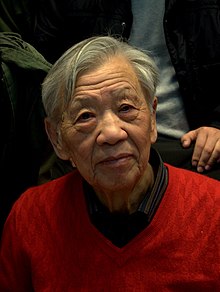Zhang Sizhi
Zhang Sizhi ( Chinese 張思 之 / 张思 之 , Pinyin Zhāng Sīzhī ; born November 1927 in Zhengzhou , Henan Province , Republic of China ) is a Chinese lawyer , university professor and civil rights activist .
Life
In 1944, at the age of 16, Zhang joined the Chinese Expeditionary Force , which, from Burma, fought the Japanese invaders in China together with the Allies during World War II . After his discharge from the army three years later, he began his studies in Xi'an with the aim of becoming a diplomat. In 1950 he graduated from the Chinese People's University in Beijing with a law degree and started his profession in 1956. The system of legal advisory offices introduced in China in 1954 based on the Soviet model was abolished in 1957 after the Hundred Flowers Movement . Zhang was among the first to be sentenced in Beijing as a deviator . He was sentenced to 15 years of detention near Beijing. During this time he experienced the great famines of the Great Leap Forward and the brutalities of the Cultural Revolution . In 1972 he was allowed to work as a teacher and in May 1979 he became active again as a lawyer. In 1980, under Deng Xiaoping, the legal profession was reintroduced.
Lawyer on behalf of the party
Zhang was used by the Chinese Communist Party to defend Mao's widow , the head of the alleged conspiracy, in the Trial of the Gang of Four . He had the same job in the trial of the Lin Biao clique .
University career, author and civil rights activist
His reputation as a good, independent defender in a legal system that is dependent on the will of the party led to his being respected and admired in China. His manual The Profession of the Lawyer. Theory and practice from 1985 and his role as director of the trade journal Chinese Lawyers set the trend for future lawyers in the country.
Zhang became a professor at the Central University for Distance Education in 1984 , professor at the Beijing China University of Political Science and Law in 1987, and later at the Central University of Finance and Economics .
In several political trials since the early 1990s, Zhang was the defender of the accused despite the fact that the judiciary has not yet been guaranteed independence. Examples are Wang Yuntao and Chen Ziming 1991, Bao Tong 1992, Wei Jingsheng 1995, Zheng Enchong 2003 and Li Zhi 2004 . In 2006, he and Professor Jiang Ping protested the threats against the weekly supplement of the Chinese Youth newspaper . Zhang was the second signatory to the 2008 Charter for which 2010 Nobel Peace Prize Laureate Liu Xiaobo was sentenced to 11 years in prison in 2009. In 2011 he took over the defense of the lawyer Li Zhuang , who in Chongqing as part of the Clean operation hands that Bo Xilai had initiated, was indicted.
Awards
- 2008: Petra Kelly Prize of the Heinrich Böll Foundation
literature
- Bout, Judith: Les confessions de maître Zhang , Nouvelles Éditions de François Bourin, Paris 2013.
- Liu Yadong and James D. Seymour: Zhang Sizhi and the Role of Defense Attorney in China's Judiciary . Sharpe, Armonk, NY 1998.
Web links
- Zhang Sizhi - Outstanding Commitment to Human Rights and the Rule of Law in China on the Heinrich Böll Foundation website
Individual evidence
- ^ Scripts of Power in Süddeutsche Zeitung of September 21, 2013, page 10
| personal data | |
|---|---|
| SURNAME | Zhang Sizhi |
| ALTERNATIVE NAMES | 张思 之 (Chinese script, simplified); 張思 之 (Chinese script, traditional); Zhāng Sīzhī (Pinyin Romanization) |
| BRIEF DESCRIPTION | Chinese lawyer, university professor and civil rights activist |
| DATE OF BIRTH | November 1927 |
| PLACE OF BIRTH | Zhengzhou , Henan Province , Republic of China |
